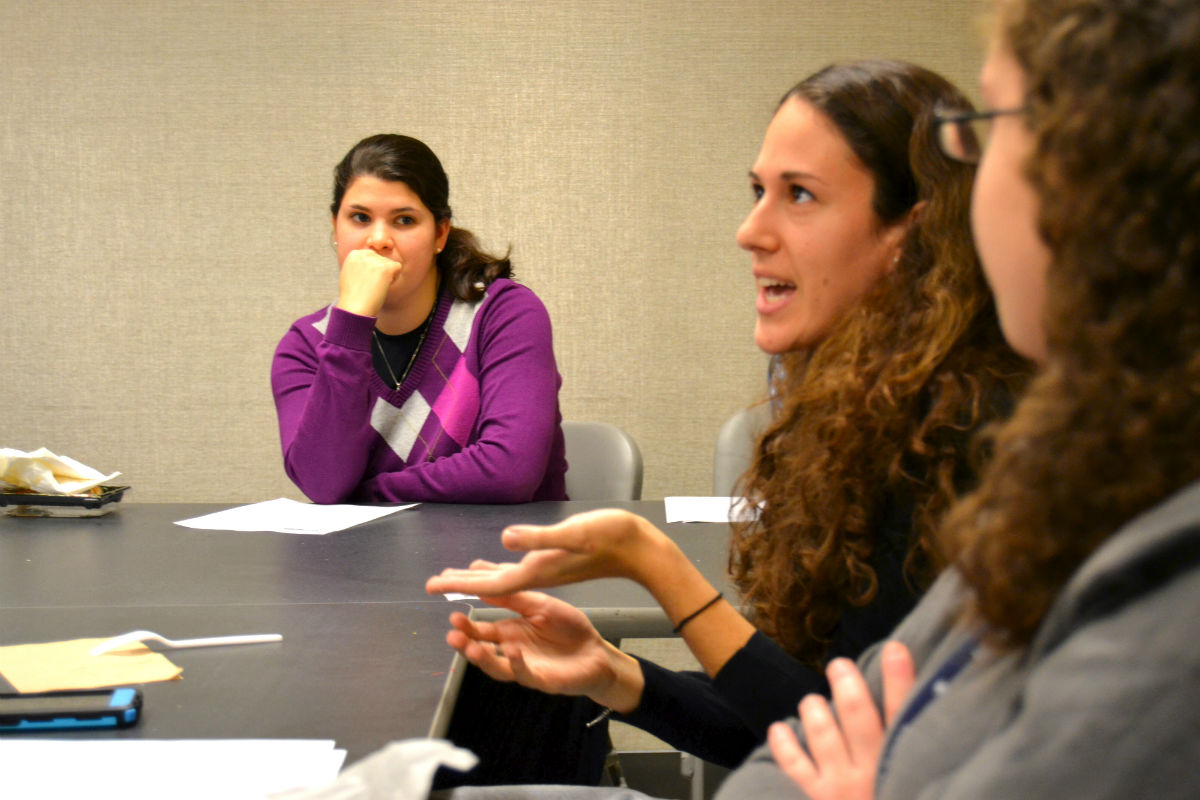Torah learning takes center stage
Lunchtime club is a student-run labor of TLC

It’s lunch hour at Lander College for Women-The Anna Ruth and Mark Hasten School (LCW). So who would give it up for another “class?”
Yet each week, a group of young women do, studying in the Torah Learning Club (TLC). Self-run, the club allows the participants to focus on a topic of choice and explore it in a freewheeling discussion.
Low key, but serious, the participants have an easy-going camaraderie. They represent a variety of majors at the college. Their common cause: a love of Torah learning.
“Everyone has a different concept about what they want to get out of the club,” says Chaya Lieba Berger, a senior psychology major from Queens, who is co-president along with senior Rivka Malka Swartz of Silver Spring, Md. “But overall it’s a time to get some TLC — [including] Torah and inspiration and connection to other girls.”
Women trickle in on a given Thursday and take their places, pulling sandwiches or containers filled with salad from their backpacks. Anywhere from six to 15 might show up for the program. The format is simple: the young women take turns, with each week a different person taking role of leader. Topics vary, with the season, chagim, and timely news events all making an impact on the text presented.
On Berger’s week to lead, she chose two pieces from www.aish.com. One, “True Colors,” details a grandmother’s memory of the Holocaust and how ones true colors – like those of autumn leaves – shine only when fading. Explaining her wartime experiences to her granddaughter, the grandmother tells how her own father – taken early during the Shoah – explained to her that human beings only show their true colors when times are tough, as leaves do when they lose their chlorophyll as the season changes.
The women debated the meaning of the piece. Could true colors be the ones they were showing now, as they stress over exams? One girl worried that her preoccupation while getting an assignment ready had led her to ignore someone trying to say hello. Were those her “true colors”?
This led to a discussion of what makes the true self: the version that shows under stress or the one that exists from day to day. “Maybe when you are at rock bottom…there is nowhere to go but up,” one girl noted.
Berger ‘s second selection told the story of Harrison Odjegba Okena, who survived three days at the bottom of the ocean in a sunken tugboat, breathing from a small pocket of air and taking small sips of Coke. It likened the survival at those literal depths to the emotional ones the families of Newtown, Conn. were experiencing as the anniversary of the school shooting was drawing close.
Berger used the first piece to set up for the second, leading to a discussion of just what those emotional depths are. Okena used his time — trapped in the uncertainty between death and rescue — to recite psalms. His faith made an impression: “He didn’t just do what he needed to survive; he made the best of it.”
The group was co-founded two years ago by Penina Gilbert, of Cincinnati, Ohio, and Rivka Goldfarb, of Cherry Hill, N.J., as a way for students to study Torah in an additional setting to that of LCW’s Judaic Studies major. The school boasts a rigorous curriculum in that department, which includes such courses as Tanach, rabbinic responsa, Jewish medical ethics, Halacha and the Holocaust and women in the Bible.
The topics are not always so contemporary. During Chanukah, Sara Wiener, a junior from Teaneck, N.J. in her second semester, chose to talk about a piece from Rabbi Beinish Ginsburg, a popular teacher at Michlalah in Jerusalem. The piece discussed the connection between dedication of the Mishkan and the lighting of the menorah.
The club provides a “best of both worlds” — learning and relaxation — according to the participants. Without tests and homework, it provides a place to learn Torah for Torah’s sake, they say.
“It’s a break from school, to learn, lishmah,” said Sara Mindel Zuckerman of Passaic, N.J. “Not just for school.”

